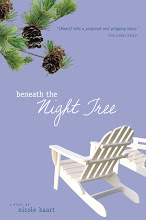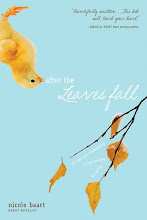Tuesday, April 6, 2010
Research
Happy Tuesday!
As I promised, today kicks off the new format for my blog. Since I like mornings, the start of the week, and new beginnings, it makes sense for me to blog about "work" on Tuesdays. And I'm starting off today with a writing doozie: research.
Though I'm no research guru, I have the sneaking suspicion that I'm about to become one... My sixth book (my first book for my new publisher, Simon & Schuster), is very loosely based on a true story. And this story is going to require a lot of me, both intellectually and emotionally. So, where to begin? The task seems daunting to say the least.
After speaking to other authors, attending seminars at writing conferences, and perusing books on the subject, I've come up with my own three-step approach to research. Take it for what it's worth, or use it and modify it to fit your specific needs! I believe research is a vital, necessary part of any good book (even if only minimal research is needed), and I'm convinced a story that has been eagerly investigated, studied, and explored will be much richer and filled with nuance and meaning. Come on, how many of you have read a poorly researched book and rolled your eyes at the author's obvious lack of knowledge on the subject? It's almost embarrassing. Anyway, as I face the seemingly insurmountable task of becoming an expert on Alaska, flying a bush plane, grieving the loss of a spouse, and falling in love again, these are the guidelines I'll be using for my research.
1. Live it.
Ever heard the expression "write what you know"? Although I don't buy that wholesale, I do think it contains valuble advice. I once read a book by a man in which he described in detail the process of childbirth through the eyes a woman. 'Scuse me? It just didn't ring true. My rule is, whenever possible, do yourself the favor of writing about things that you know intimately.
To that end, I'm on my way to Alaska! The tickets are booked, the interviews are lined up, and yup, I'm going to put my life in the hands of a real, live Alaskan bush pilot. Though I have to stay below 6,000 feet because of the baby, I'm really excited. But some people have asked me why I feel the need to fly across the continent for research... To me, it's a no-brainer. How can I capture the essence of Alaska (the scent of the air, the height of the trees, the sound of the waves crashing on the shore) if I've never been there? How can I explain what it's like to fly in a bush plane over the mountains if I've never done that? I can't. At least, not convincingly. Thus, off to Anchorage I go.
2. Experience it vicariously.
Can't fly to Alaska? Or grieve the death of your spouse (I certainly hope not), or know what it feels like to have a disabled child? I believe that if you can't manufacture an experience, the next-best thing you could do is spend time with someone who has lived it. Get yourself a primary resource, someone whose insight and knowledge can give your characters depth and meaning.
I might be going up in a bush plane, but that certainly doesn't make me a pilot. Since I know absolutely nothing about what it takes to fly in the wilds of Alaska, I have "interviews" (i.e. long talks over pints of beer--for them, not me) scheduled with pilots and other Alaskan natives. I am looking forward to these interactions so much! I can't wait to glean wisdom from these amazing people.
3. Learn about it.
I think this is the first place that many people look for information, and though I'm as happy as anyone about the amount of data at my fingertips thanks to the wonders of the World-Wide Web, I'm disappointed in our unswerving reliance on it. Wikipedia seems to have replaced experience. Why ask an expert (i.e. talk to a real person) when I can Google it? Boo. And yet, sometimes you do need to research the traditional way by hitting the books (or the keys).
Between the flying, the interviews, and the all-around Alaska experience, I will also be spending some time at the Loussac Library in Anchorage. Apparently, they have an entire wing dedicated to Alaskan heritage and folklore--including journals and historical documents. I get chills just thinking about it.
Well, that's my master plan. I know I'll hardly be an expert by the end of my short trip, but I hope to garner enough knowledge and experience to give my book the authentic feel that I believe it needs. And don't worry, I promise to take tons of pictures and post all about my time in the great white north. :)
Your turn: Do you think research is important? Have you ever read a poorly researched book and known that the author was full of it? What about if you write...? How do you research? Do you consider it important? Or am I expecting too much of myself (and other writers)?
Subscribe to:
Post Comments (Atom)











No, I think research is incredibly important for any book. The story I've been working on for about two years now actually requires some research on law and the court system. I have no idea how I'm going to get that information besides reading through a book because I don't know anyone who deals with the type of case my story contains. So, hopefully I'll be able to find out enough through the books! But I think your method would work very well. I think you've got all the important approaches worked out. Good luck with your research. I hope it goes well and you and the baby stay safe! :)
ReplyDeleteHave you considered sitting in on a hearing, Lauren? Is there a courthouse nearby? Even if the case isn't related to what you're writing about, it might be helpful to spend some time in a real live courtroom situation instead of relying on TV/movie experience. I've been to court a couple times and it's nothing like Law & Order. ;) Who knows? You might rub shoulders with a few industry professionals and make some friends that you can spend some time chatting with (and asking questions). Offer to buy them coffee! That always seems to smooth the way... :) Good luck!
ReplyDeleteI believe in writing what you know, but quality research is invaluable. I've taken my AIr Force Reserve experiences and woven them into many areas of my writing. However, I knew very littel about autism when I began writing the story of an eight-year-old autistic boy two years ago. I read all the research I could get my hands on and spent hours observing children (with parental consent) who had a diagmosis somewhere on the spectrum. Though I do not have an autistic child of my own, sharing an environment with children with autism proved to be the best way for me to find the words I needed to create believable prose.
ReplyDeleteNicole – I was stationed at Elmendorf AFB, AK. There is a wonderful little restaurant outside of Anchorage in Girdwood (about 45 minutes) called Double Musky Inn. It’s a family owned joint on Crow Creek Hwy. It’s a piece of Alaska you have to experience.
You know, there is a courthouse that's right down the road from where I work. I never thought about doing that before. Great idea, thanks! :)
ReplyDeleteOh, my goodness! We're staying in Girdwood at the Alyeska Resort and Spa! I will definitely put the Double Musky Inn on our itinerary. Thanks for the recommendation. :) As for your research strategy, I applaud your commitment to experiencing autism firsthand. I'm sure it will add authenticity to your work.
ReplyDeleteLauren, let me know how it goes!
Completely off topic. I'm a rebel that way.
ReplyDeleteAre you still watching Parenthood?
Yes, I'm still watching Parenthood! :) I love it. Though we didn't see last night's episode... We DVR it and watch it at our convenience. Anything interesting happen???
ReplyDelete